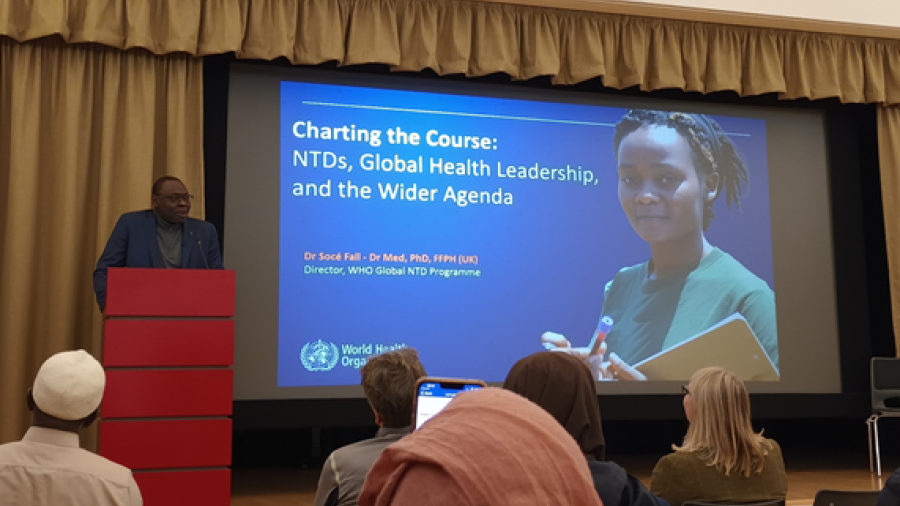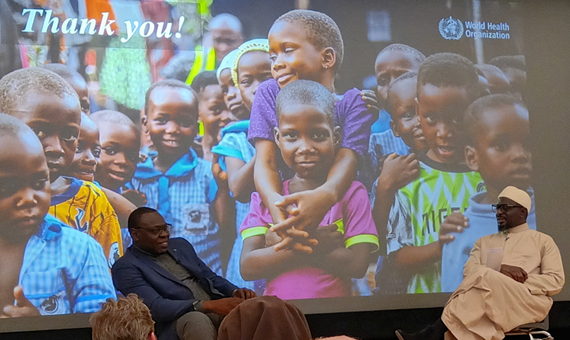How to rebuild a city with Karam Alkatlabe


The Wolfson Global Health Hub kicked off its first event of the academic year on Friday 10th November by inviting the esteemed WHO Director of the Department of Neglected Tropical Diseases, Dr Socé Fall, to lead a discussion on Neglected Tropical Diseases (NTDs) and Global Health Leadership.

Starting his career as a military physician in the Senegalese military, Dr Fall gained in-depth experience with communicable diseases and epidemic control. The importance of public health was apparent in his work, and he held various public health positions in his native Senegal, including leading provincial level immunisation programmes, lecturing in public health, and leading a division in the Military department of Health.
Since then, Dr Fall has had a long successful career in the WHO, working on malaria control and epidemic response. As the Regional Emergency Director for WHO (2015-2019), Dr Fall was responsible for leading the WHO’s response to the Ebola Crisis, and more recently he served as the Assistant Director-General in charge of the WHO’s emergency response to high-impact epidemics, humanitarian crises and acute public health events globally.
Now, as the WHO Director for Neglected Tropic Diseases, Dr Fall is responsible for coordinating efforts to reduce the global impact of 20 conditions that affect more than 1 billion people who live in impoverished communities, such as Leishmaniasis, Schistosomiasis, Leprosy and Dengue.
These diseases contribute to a cycle of poverty for these communities. Lack of resources and infrastructure, such as access to clean water, sanitation and quality healthcare, lead to poor transmission control and lack of treatments. Poor health and disability for those affected, especially for younger children losing out on education, contribute to impoverishing communities further.
Climate change has also increased the burden of NTDs, for example extreme weather events impact sanitation, and increasing global temperatures increase the spread of vectors such as sandflies and mosquitos. The response to NTDs must be interdisciplinary. Prevention relies on effective vaccines and prophylactic medicines, public health messaging, veterinary public health to reduce transmission through animal populations, improving Water, Sanitation and Hygiene (WaSH), and controlling vector transmission.
Dr Fall presented the WHO Neglected Tropical Disease road map 2021-2030, which outlines the WHOs strategies for reducing the number of people requiring interventions against NTDs by 90% by 2030 and aims to eradicate at least one NTD in 100 countries. Dr Fall highlighted many challenges in achieving these targets, including climate change, rapid population growth, and conflict and political instability. This emphasised the importance of global health leadership to coordinate multiple stakeholders, use limited resources efficiency, build capacity in health systems, and make effective decisions during health crises.
The future global health leaders need to be able to work effectively in teams, work with compassion, and above all require courage to take on these health challenges.
We were delighted to welcome Dr Fall on his first visit to Cambridge, and thank him for an excellent and thought-provoking presentation. Thanks also to Wolfson Fellow Dr Aliko Ahmed for extending the invitation and hosting the discussion, and to all those who attended and contributed to a rich discussion about the future of NTD response and global health leadership. We look forward to welcoming you back to our future events!
The recording of Dr Fall’s talk can be found on the Wolfson College Youtube Channel here.
Read about the WHO Neglected Tropical Disease Road Map here.

Dr Soce Fall and Dr Aliko Ahmed leading discussion







